In this post, I will explain how NFT trading has become accessible on various blockchains, something collectors and investors are starting to do.
Multi-chain NFT trading enables individuals to buy, sell, and move digitals assets to and from Ethereum, Polygon, and Solana.
The advantages are decreased costs, transaction speeds, and a wide array of NFT collections to choose from throughout different blockchain ecosystems.
What Is Multi-Chain NFT Trading?
Multi-Chain NFT Trading is the practice of performing buy, sell, or transfer functions on Non-Fungible Tokens (NFTs) on multiple blockchains like Ethereum, Solana, Polygon, or Binance Smart Chain.
Trading on multiple blockchains rather than just one opens the user to various NFT collections, and adds the competitive advantage of cheaper costs and speedy transaction times on various blockchains.
Transactions involving multiple blockchains comprise the use of compatible wallets, NFT markets, and safe asset transfer bridges. This technique provides NFT traders and investors enhanced participation in the NFT ecosystem, which is interconnected and rapidly growing.
How To Trade NFTs on Multiple Blockchains
Example: Trading NFTs on OpenSea (Multi-Chain)
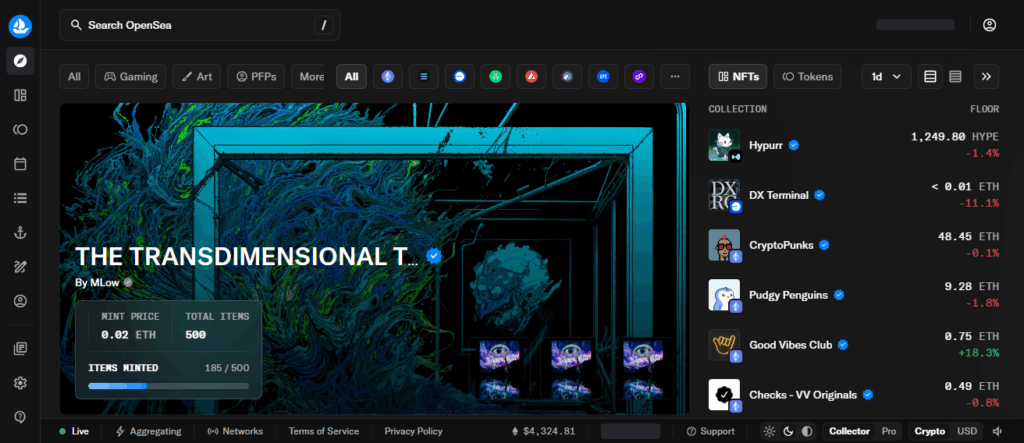
Set Up Wallet
Install a multi-chain wallet like MetaMask or Coinbase Wallet to securely manage NFTs across different blockchain networks.
Connect Wallet
Link your wallet to OpenSea, ensuring proper blockchain selection for seamless NFT trading and access to your digital assets.
Select Blockchain
Choose the NFT’s blockchain, such as Ethereum or Polygon, depending on where the NFT is listed for trading.
Browse NFTs
Explore available NFTs on the selected blockchain, filtering by categories, creators, or collections to find the desired digital asset.
Use a Bridge (if needed)
Transfer NFTs between blockchains using a trusted bridge like LayerZero or Wormhole to enable cross-chain trading.
Buy/Sell NFT
Complete the NFT purchase or listing by confirming transaction details, including gas fees, marketplace fees, and payment currency.
Verify Ownership
Confirm the NFT appears in your wallet on the target blockchain, ensuring the transfer or purchase was successful.
Importance of Multi-Chain NFT Trading for Collectors and Investors
Access to Diverse Collections
With multi-chain trading, collectors and investors can engage with NFTs on a multitude of chains including Ethereum, Solana, and Polygon, allowing the collection of truly unique and rare digital assets compared to what is available on a single chain.
Lower Transaction Fees
Unlike Ethereum, blockchains like Polygon and Solana have much cheaper gas fees, making the trading costs of NFTs much lower which in turn increases potential profit margins.
Faster Transactions
Blockchains have different transaction speeds. Multi-chain trading allows for faster transfers, purchases, and sales of NFTs which leads to increased efficiency in trading.
Investment Diversification
Investing in NFTs on different blockchains helps reduce net risk and exposure to volatility on a single network, offering a much better risk framework for the investor.
Exploiting Market Opportunities
Investors can engage in arbitrage on multi-chain platforms by exploiting the price differentials for the same NFT on different chains.
Enhanced Flexibility
Collectors with multi-chain capabilities can transact in multiple ecosystems and marketplaces without being restricted to a single blockchain. In other words, they have greater freedom to buy, sell, or display NFTs.
Participation in Emerging Ecosystems
With the advent of a new blockchain often come new and exciting NFT projects. Multi-chain trading provides the tools necessary to access new opportunities long before they gain mainstream traction.
Wallets That Support Multi-Chain NFTs
1. MetaMask
MetaMask is an extensively utilized multi-chain wallet that works with Ethereum, Polygon, and Binance Smart Chain.
Users can conveniently connect to numerous marketplaces and safely store, send, and receive NFTs.
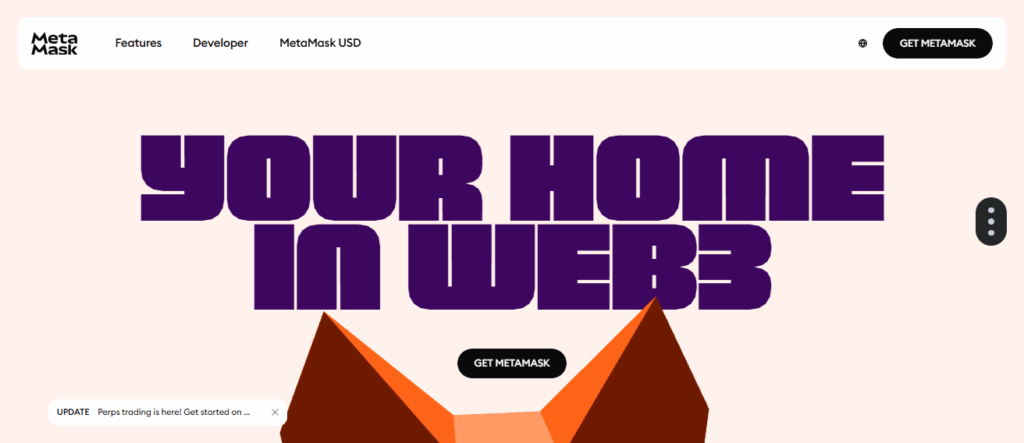
As a Web3-enabled app, it allows collectors to manage their NFTs, sign various permissions, and engage in cross-chain trading of NFTs, which suits novice and seasoned traders.
2. Phantom
Primarily associated with the Solana blockchain, Phantom is a well-known wallet that, through bridging, also works with Ethereum and other chains.
Besides having a simple interface with rapid transaction capability and safe private key storage, Phantom directly connects with NFT marketplaces
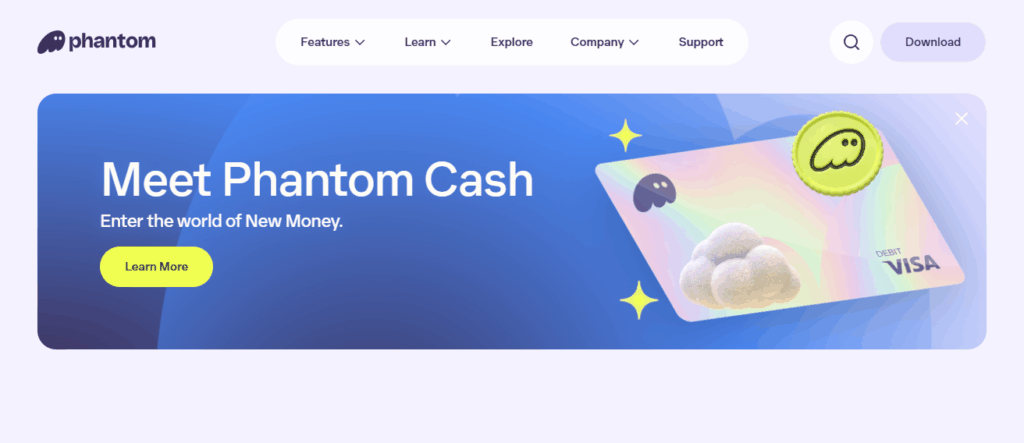
like Magic Eden, letting collectors seamlessly manage the purchasing, selling, and transferring of NFTs across various blockchains.
3. Trust Wallet
Trust Wallet is mobile-first and supports multiple blockchains including Ethereum and Binance Smart Chain. Users can store NFTs, manage tokens, and use decentralized marketplaces.
The wallet’s multi-chain capability encompasses trading NFTs and securely bridging, moving, and transacting collectibles across networks.
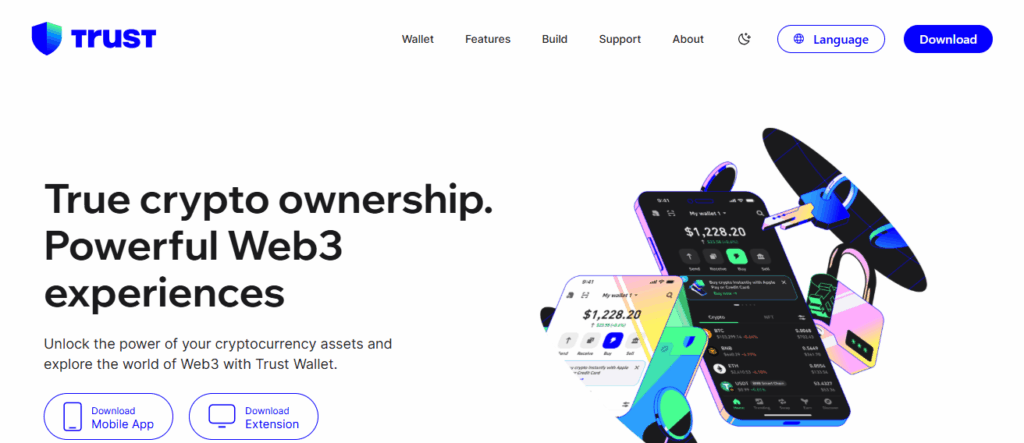
It is accessible and straightforward, targeting collectors keen on trading NFTs from their mobile devices.
4. Rainbow Wallet
Rainbow Wallet offers a user-friendly NFT management experience and emphasizes Ethereum and Ethereum-compatible networks.
Users can store, see, and trade NFTs across multiple chains and use active bridges to facilitate integration.
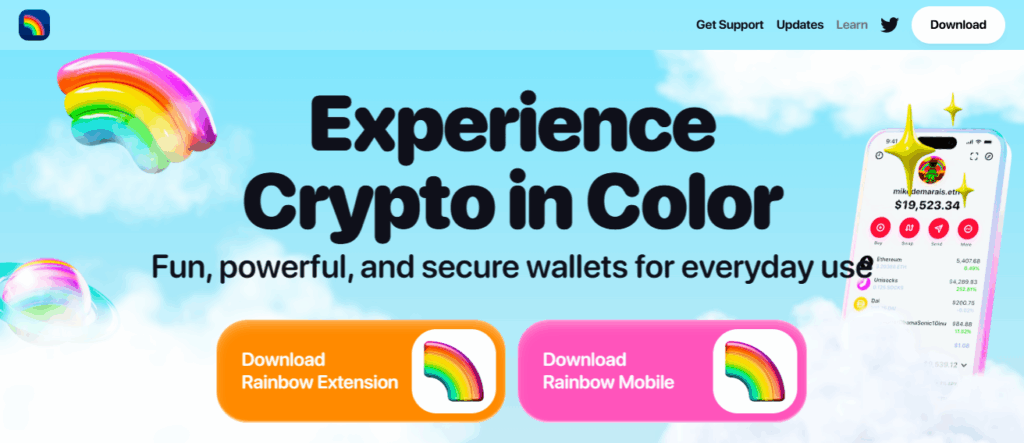
The wallet directly connects users to marketplaces, offers access to real-time gas fee prices, and provides heightened security
for users managing their multi-chain NFT portfolios, making this wallet a valuable tool for collectors and investors.
Benefits of Trading Across Multiple Blockchains
Access to Diverse NFTs: Different blockchains offer different NFT products. NFTs are traded across blockchains to access different collections.
Lower Transaction Fees: Transacting on different blockchains helps to minimize costs associated with the purchase or sale of NFTs.
Faster Transactions: Trading NFTs on blockchains with faster transaction speeds decrease the time needed for transactions to go through.
Investment Diversification: Utilizing different blockchains for your NFTs helps to decrease risk associated with your investments.
Arbitrage Opportunities: The difference in price of NFTs on different blockchains can provide profitable trading opportunities.
Flexibility in Marketplaces: The ability to buy, sell, or display NFTs in different marketplaces increases the number of options available.
Challenges of Multi-Chain NFT Trading
Compatibility Issues: Not all wallets or marketplaces support every blockchain, limiting access to certain NFTs.
Complex Wallet Management: Managing different multiple wallets and private keys associated with different blockchains can be risky.
High Transaction Fees: Cross-chain transfers and NFT purchases can become costly due to bridge and gas fees.
Bridge Vulnerabilities: Exploits on NFT bridges can lead to devastating losses due to their security risks.
Slower Transfer Times: Delay of NFT transfers can be caused by the bridge or blockchain used in transfers.
Limited Liquidity: Fewer buyers or sellers on certain blockchains can limit your ability to trade quickly.
Tips and Best Practices
Always Double-Check Contract Addresses
Thoroughly verify NFT and marketplace contract addresses to prevent scams and ensure genuine transactions.
Avoid Unverified Bridges and Marketplaces
Unverified and unaudited cross-bridge and marketplace transfers can put your assets at risk.
Keep Track of Gas Fees and Transaction Times
By tracking the congestion and gas prices, you can trade your NFTs efficiently.
Diversify Across Blockchains to Minimize Risk
Minimize the risk of a network failure by spreading and diversifying your NFTs across blockchains.
Conclusion
To conclude Trading NFTs on different blockchains enables collectors and investors to diversify their assets, lower costs, and enhance speed.
With the aid of dependable wallets, secure bridges, and trustworthy marketplaces, ecosystem crossing is possible.
Nevertheless, caution and due diligence are required; for safe and lucrative experiences in multi-chain NFT trading, safe platform verification, fee tracking, and holding diversification are best practices.
FAQ
It means buying, selling, or transferring NFTs across different blockchain networks.
No, multi-chain wallets like MetaMask or Trust Wallet support several blockchains.
OpenSea, NFTrade, and Rarible support NFTs from multiple blockchains.
Use trusted NFT bridges like LayerZero or Wormhole.
Yes, bridges and different blockchains may charge gas and transaction fees.



